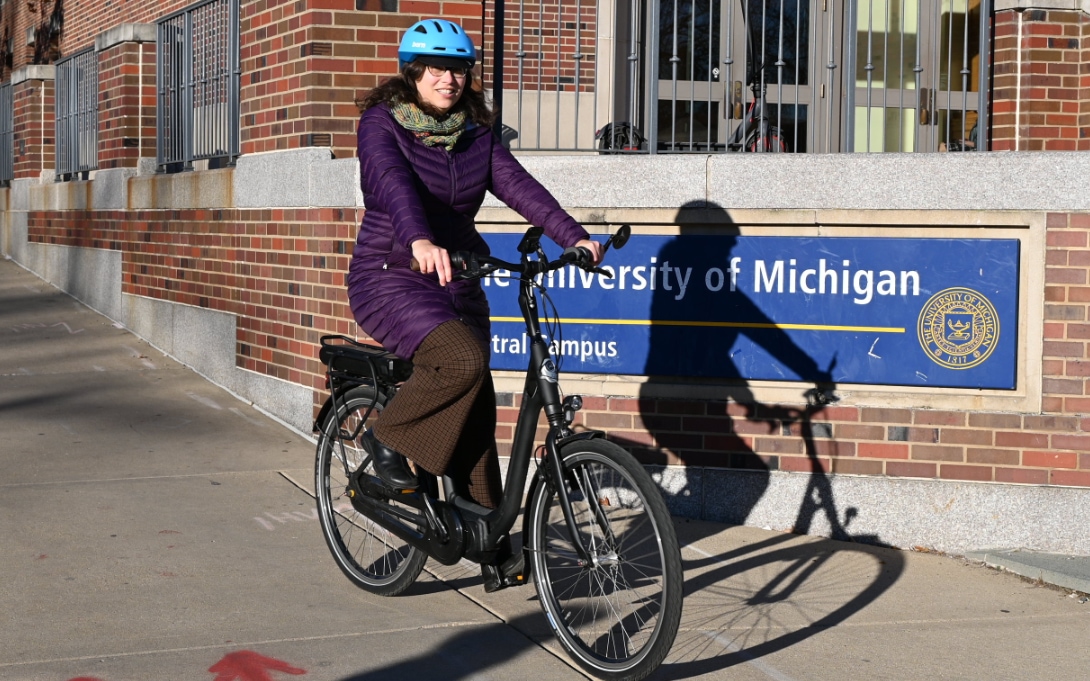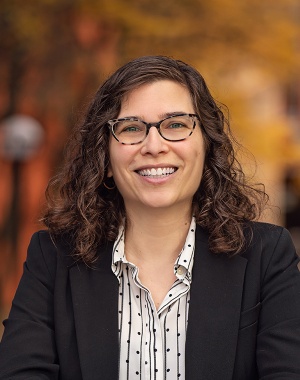
Molly Kleinman (MSI ’07, PhD CSHPE ’18) joined the Ford School’s Science, Technology, and Public Policy (STPP) program in 2018 and became managing director in 2021. She received her STPP certificate in 2014 and served as Paul Courant’s special assistant when he was dean of Libraries (2009–2011). Kleinman is a huge advocate for biking and walkability in Ann Arbor and is the co-founder of a cycling nonprofit. In her spare time, she serves on the City of Ann Arbor Transportation Commission and as a trustee of the Ann Arbor District Library and also co-hosts an irreverent, very smart podcast about civic life in Ann Arbor.
State & Hill: What motivates your public service?
Molly Kleinman: For me, it’s love and rage. I want us to live up to the ideals we say we have, especially in Ann Arbor, where we have a reputation for being this sort of hippie, green place that cares about sustainability. But when you get down into the nitty-gritty of local policy and local reality, that’s not always what implementation looks like. So a lot of work that I’ve done around transportation has been trying to push us closer to who we say we are.
The biggest source of emissions in this country is private cars. The City of Ann Arbor passed this really incredible plan with the very ambitious goal of getting to zero carbon by 2030. One of the ways we get there is by cutting vehicle miles traveled. We have to reduce it by fifty percent, and the status quo won’t get us there. So we need to make some really radical changes.
Transportation and housing are tightly linked. Dense housing enables thriving and frequent public transit, which makes it easier to live without a car; the fewer cars on the road, the safer it is to bike or walk and the more pleasant it is to do all of those things. It’s this wonderful virtuous circle. Then more people want to live here and the more people who live here, the fewer people are driving into the city for work and the fewer emissions we have. And it also comes back to this work around justice and equity because I want people to be able to afford to live here too.
S&H: What did your journey to public service look like?
MK: In 2016, I made a promise to myself to get involved locally to make things better in my small corner of the world. I was finishing my PhD, working full time, and had two kids under age four. So, when I finished my dissertation, I was looking for ways to be involved. I am the co-founder of a cycling nonprofit, and a former colleague knew the Transportation Commission was looking for someone to fill an open position. She said, “You like bikes,” and that was it! I was thrown into the deep end of local politics, and I’ve learned a ton from being on the commission.
S&H: What’s one thing you’ve learned?
MK: One thing that’s cool about a place like Ann Arbor, and I think a lot of smaller cities, is that it’s easy to connect to your elected officials. They are just regular people in the community. You can just talk to them, and some of them will listen to you! Each individual person has more power than they realize.
S&H: What is your proudest accomplishment on the Transportation Commission?
MK: One of my proudest accomplishments was the “Healthy Streets” program that the city implemented during the pandemic. City staff designed and made the proposal, but it was not going to go anywhere. I helped bring attention to it and pushed for it to happen. The implementation didn’t always go quite right, but I feel like it laid the groundwork for some more permanent changes that have been starting to happen around the city that are really great.
There’s other stuff I have been able to do because now I’ve learned how things work in city government. I helped organize a sidewalk petition in my neighborhood that broke the city’s record with the most signatures. In some ways, that’s really what I am proudest of because my kids could see the change. My kids could never walk home from the school bus by themselves because there was no sidewalk. By the end of next summer, they’re going to be able to walk to their friends’ houses independently, which I believe is how it should be in the city. We should be building cities so that kids can move around safely and independently.
S&H: What are some other ways that you walk the walk?
MK: I bike to the office. I organized a walking bus in my neighborhood where parents take turns walking a group of kids to and from school. The kids love it and love walking with their friends.
I had never biked for transportation before I moved to Ann Arbor. I rode bikes recreationally with my family growing up. We would put our bikes on the back of the family car to drive somewhere and then get on a path and ride for fun. When I moved to Ann Arbor, it was the first time I lived anywhere with a bike lane. Ann Arbor was small and compact enough that I was like, “oh, I could ride my bike,” and it turns out that riding my bike was faster and more fun than any other way of getting places.
S&H: How did you come to be on the library board?
MK: Once you get on a city commission, people start looking to you to run for things. I’m a former librarian, and I love Ann Arbor libraries. I was appointed in March 2020 to an open position. It was a surreal experience. Usually, when you get sworn in, they bring in the judge, but I had to go to the Credit Union drive-through and send my paperwork through the pneumatic tubes. Then I swore on the steering wheel of my Honda Fit to uphold the State of Michigan constitution.
I ran to serve on the board in November 2020 and was elected. I came onto the board during this moment when the library was facing all these enormous challenges. Everyone was talking about how we were going to keep serving our community when we couldn’t open our doors, when we couldn’t be together. I got to witness the amazingness of our library leadership and our library staff and the ways that they found to create community and opportunity for people when they couldn’t be together. It felt like a real privilege.
S&H: What has been a proud moment for you on the library board?
MK: We have this one library box truck that drives to all five branches every day and it was nearing the end of its useful life. We could get a new internal combustion box truck for $70,000, or we could work with a third party to basically take a new box truck and turn it into an electric vehicle, and that would be $220,000. On one hand, we are responsible for the fiscal stewardship of the library, but we’re also responsible for the health and safety of the community and these values like sustainability. Ultimately, we decided to buy the electric version, and it happened to be the week that Ann Arbor was blanketed in wildfire smoke for the first time. I’ve had conversations with my kids about how there’s a lot that we need our leaders to do, and we try to elect leaders who will do these things. I was able to come home and say, in my tiny little leadership role, that I was able to make a choice that would help make the world better. It felt really good.
S&H: What do you want people to take away from your podcast, Ann Arbor AF?
MK: I want to empower people to learn about how things work in the city, focus on a piece that they care about, and learn how to engage and get involved. It might be serving on a commission, or calling into a council meeting, or running for office. If people understand the arcane insider stuff, then they’ll know which levers to push on and can help push for change.
S&H: Which are the most popular episodes?
MK: The ones getting the most listens are the ones where my co-host Jess and I have a lot of frustration, anger, and sadness—big feelings. We’ve moved toward doing a season on what we are calling “civic therapy,” where we just talk about issues we are passionate about. Sometimes we talk about things that are in the news. Other times we talk about more evergreen issues. We did one episode about a bridge widening project where I pulled in a lot of my STPP knowledge to explain the way I saw our elected officials dismissing the expertise of the people who have to move through the intersection every day. At STPP, we’ve done a lot of work about recognizing community expertise.
S&H: Tell us more about what’s new with the STPP program.
MK: Our community partnership initiative is really taking off. We are working with advocacy and direct service organizations in Detroit that have an equity or social justice lens. We ask them: what are the issues that you are dealing with related to science and technology? How can we bring in technical and policy expertise to help address the challenge? Sometimes the technology is a solution to a problem; sometimes it’s technology being used on the community (like surveillance); and sometimes it’s a bigger issue such as dealing with flooding or waste water. Our research is guided entirely by the partners. Instead of producing academic articles, we are producing policy memos, FAQs, or one-pagers to help our partners communicate with policymakers or stakeholders to accomplish their goals.
An abridged version of this interview appears in print.
More in State & Hill
Below, find the full, formatted fall 2023 edition of State & Hill. Click here to return to the fall 2023 S&H homepage.
